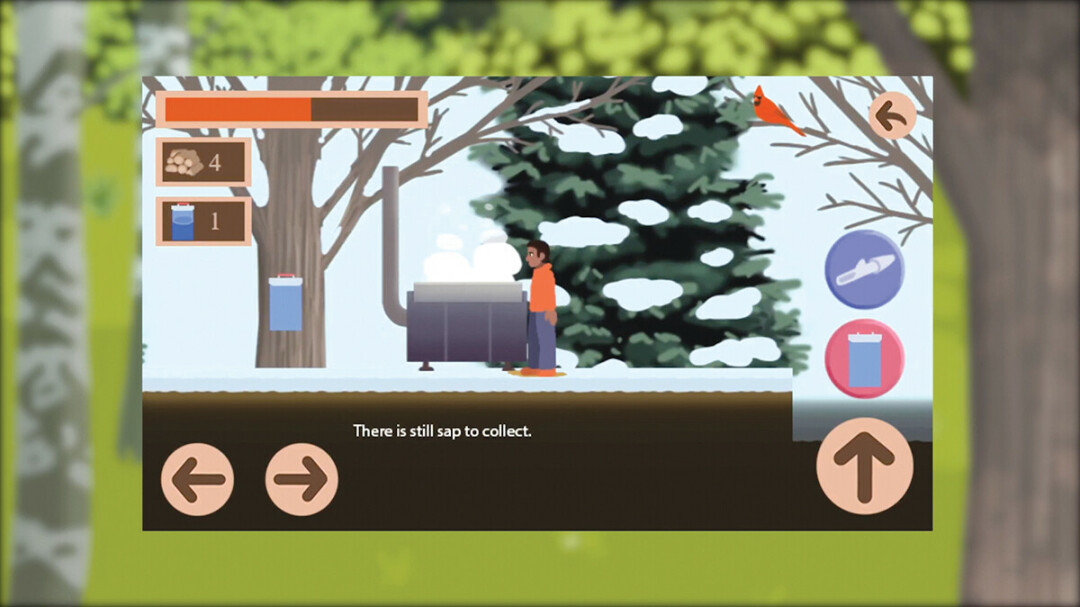Student’s Video Game Explores Ojibwe Traditions
UW-Stout junior creates game that explores Native American culture, sovereignty
Eleanore Falck loves bringing worlds to life.
The UW-Stout junior majoring in game design and development-art created “Growing Up Ojibwe: The Game” during a summer internship with the Great Lakes Indian Fish and Wildlife Commission in 2019 and then expanded the game during an internship last summer.
“I like world-building,” said Falck, of Ashland. “I can invent many things that fit together. I like adventure and exploration. It’s something I am drawn to. When I go to a new place I want to explore everywhere and look at everything. I want to put that feeling in the worlds I build. I like that people can go to a place you created and experience it for themselves.”
“Growing Up Ojibwe: The Game” is based on a children’s book series with the same name and geared toward middle school-age children. GLIFWC published the books.
GLIFWC represents 11 Ojibwe tribes in Minnesota, Wisconsin, and Michigan who reserved hunting, fishing, and gathering rights in the 1837, 1842, and 1854 treaties with the U.S. government. The organization provides natural resource management expertise, conservation enforcement, legal and policy analysis, and public information services in the exercise of treaty rights.

Players can choose to play as either Tommy or Annie Sky, two Ojibwe youth, as they embark on a journey through northern Wisconsin to learn about their heritage. The game features five levels, each exploring an aspect of Ojibwe life and culture including treaty rights and sovereignty, maple sap gathering, spearfishing, and wild rice harvesting.
When Falck started her GLIFWC internship, she was asked to help the organization connect with and educate middle school-age students.
“We learn at UW-Stout in our game design classes that games are a great way of teaching,” Falck said. “Whenever you are playing a video game you are learning. Games teach players the mechanics of the game. You repeat things and remember them. Because you are doing the activity, what you’re doing becomes a part of your experience, rather than reading about someone else’s experience.”
In the summer of 2019, Falck developed the first three levels of the game. She finished the last two and added the Annie character the next summer. “I’m pretty proud of what I’ve made,” Falck said.
“I like world-building. I can invent many things that fit together. I like adventure and exploration.” –Eleanore Falck, UW-Stout student and game designer
As a descendant of the Oneida Nation, Falck grew up harvesting wild rice and maple sap for syrup. In the game, players collect wood and maple sap and harvest wild rice. Along the way, they explore the beautiful environment of northern Wisconsin and offer asemaa (tobacco) to spirit helpers and knowledge holders.
Players also encounter community members, who ask questions to learn the knowledge players have obtained. Interacting with spirit helpers, knowledge holders, and community members will earn points, representing a player’s spiritual, emotional, and physical well-being.
During the internships, Falck learned more about treaty rights and tribal sovereignty as well as spearfishing. In the 1980s and early 1990s, there were many violent clashes in northern Wisconsin over the issue of Ojibwe spearfishing. White protestors showed up at boat landings as Ojibwe prepared to spear walleye and other species. Crowds often shouted racial slurs, threw things at the Ojibwe and accused them of overfishing, according to the Milwaukee Public Museum.

The game emphasizes the Ojibwe beliefs in sustainability and caring for the environment by only taking some of the fish and using canoes to gather wild rice to protect the plants for future generations, Falck said.
Karl Koehle, a UW-Stout lecturer in game design and development and Falck’s adviser, said he has completed the game and enjoyed the experience. “The overall design is professional, the artwork is both beautiful and plentiful, and the game mechanics are unique, too,” Koehle said.
Games are good at telling stories, allowing players to interact, imagine, and learn, Koehle said. “I admire how well this game introduces matters of sustainability and respect for nature,” Koehle added. “Fishing, for example, can be a common mechanic in games. However, the focus is typically on collecting from a sea of unlimited digital fish. ‘Growing Up Ojibwe’ models real-life rules – getting a spearfishing license, explaining limits of fish size and count – and explaining why these best practices of harvesting resources are in place. The game illustrates an ethical obligation to the environment and the future.”
The game is available to download or play online in Windows (visit glifwc.itch.io/growing-up-ojibwe-the-game) or for Android devices through the Google Play Store.






















